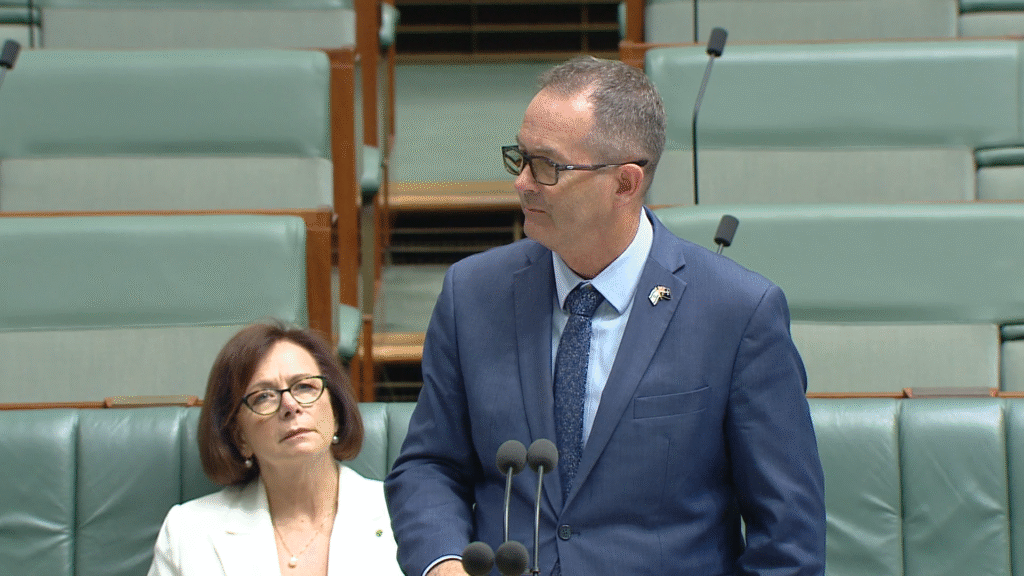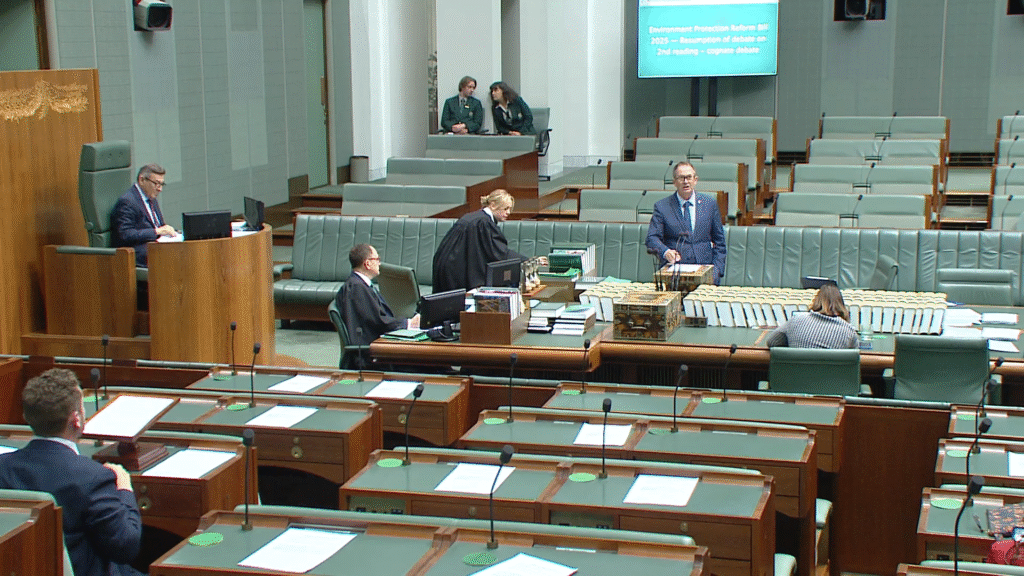House of Representatives Date: 4 November 2025
Speaker:
I give the call to the Member for Fisher.
Andrew Wallace MP:
Thankyou Mr Speaker. The motion that’s just passed the House is emblematic of this government’s approach to a lack of scrutiny. That same lack of scrutiny that we saw in this House in relation to the Freedom of Information Bill, where the government did not want that debate to be held in this chamber and moved it off to the Federation Chamber. It is the same sort of lack of transparency that this government is becoming renowned for. Of course, I am referring to the fact that the government refuses to debate other bills, like the Crimes Act.
Speaker: Order, the Member for Fisher. We’re not talking about the general debate. We’re on the bill now. You’ve been given the call about the second reading on the Environment Protection Reform Bill 2025, so—
Andrew Wallace MP: Well, I am going to get to the substantive matters, Mr Speaker. I am only a minute and 10 seconds into my speech.
Speaker: Yes, I know, but—
Andrew Wallace MP: But it goes to the point that this government continues—
Speaker: Just pause. Resume your seat. I’m just saying: if you’re going to give a general debate, make it relevant to the bill. Don’t just go and talk about other bills or other topics or other things. Just be nuanced and make it relevant to the bill, not just a general slash and burn on a whole range of topics. Just make your comments relevant to the bill, and you’ll be fine and within the standing orders.
Andrew Wallace MP: Thank you, Mr Speaker. Australians, by their very nature, want to protect the environment. I think almost everybody in this place would agree. But what we’ve seen, particularly over the last 15 to 20 years, is that the current law, the EPBC Act, is deficient in many respects. I was being specifically relevant to these bills before the House, all seven of them. Effectively, what this government is seeking to do is truncate debate on all seven of these bills, because this government wants to shut down debate. It doesn’t want to see its legislative agenda being scrutinised a moment longer than it possibly has to, and that’s why this government continues to play procedural games and to shut the opposition down at the first opportunity, despite them consistently having opposed that sort of stuff when they were in opposition.
The coalition government introduced legislation when the current Leader of the Opposition was the Minister for the Environment. She commissioned Professor Graeme Samuel to undertake a review of the EPBC Act. The coalition government introduced legislation to undertake reforms, including streamlining pathways, but that was blocked by Labor at the time. But, true to form, it’s now putting this sort of stuff back into this bill.
When Minister Plibersek was the environment minister, she tried to introduce reforms in the last parliament. However, they were too left wing for Labor, which is why the Western Australian Premier stepped in and contacted the Prime Minister. Just like that, overnight, the bills were stopped.
Labor have promised at two elections to deliver an environmental protection agency. After four years, they’ve not been able to deliver on that promise. Labor have now introduced proposed reforms in the chamber. However, in trying to ram them through, the bills have already been sent to a Senate inquiry, reporting back on 24 March 2026. I know that the people in the gallery right now, and anybody who might be watching or listening to this transmission, would be wondering: “Hang on a minute. These bills, all seven of them, have been referred to a Senate inquiry. Why are we talking about them now on the floor of the House of Representatives?” And that would be a pretty reasonable question to ask because the whole idea of the Senate inquiry is to look in detail at the merits of these bills, specifically drilling down into detail on their provisions.
Yet here we are today, in early November. The Senate inquiry into the bill is not due to come back until 24 March 2026. How can it be that this chamber can have a meaningful debate without the scrutiny of these bills? How can that be? If anybody can explain that to me, I’m all ears. But this is emblematic of the way that this government operates: to ram legislation through at any cost.
And we’ve seen that. We’ve seen it, just in the last couple of weeks, in the national security legislation that I’ve had the carriage of. Ram it through, don’t worry about it. The fact that there is a Senate inquiry on foot that hasn’t even released a report? Don’t worry about that, let’s just get the bill through. That is what Australians are dealing with, an arrogant government with a supermajority. That’s what happens when a government gets a supermajority and believes that it is beyond reproach and beyond being accountable to the Australian people. The coalition respects the outcome of the election, but what we are seeing is that this government is, increasingly, day in and day out, ramming through legislation in this place without proper scrutiny and without giving the coalition the opportunity to be heard and to properly scrutinise what is, in effect, 1,500 pages of legislation and explanatory memoranda. This bill was alerted to the coalition last Thursday, not nine years ago. This bill was provided to the coalition last Thursday. It’s 1,500 pages. Just totally disregard the fact that there is a Senate inquiry on foot at the moment. The government says: “Let’s just ram this through. To hell with the opposition. To hell with the Australian people.”
The minister is looking to do a deal with either the coalition or the Greens in relation to these bills by calling back the bills from the Senate inquiry process to pass the legislation by the end of this year. They want this through the parliament by the end of this year. In their current form, the bills do not provide an improvement for business, and the coalition cannot support them as is. The Business Council of Australia, as the key public commentator to date, has been clear. And they’ve said that, without significant changes to this bill, we risk embedding a system that’s even slower, more complex and lacking in the clarity and certainty needed for investment. So third-party stakeholders are saying that these bills are problematic. They’re saying that these bills will create a whole new heap of bureaucracy which is even worse than what we’ve currently got.
I want to just stop and pause for a moment, because I want to tell a salient story about a road project in my electorate, in Caloundra, in the seat of Fisher. This is a project that was going to be, emphasis on “going to be”, funded by all three tiers of government. It wasn’t a big road project, like some of the projects that we get involved with at a federal level. It was a relatively modest project. If I remember correctly, it was certainly under $100 million, which, for a road project, is a modest project from the federal perspective, at least. When we were in government, we committed funds for this road project. It wasn’t a lot of money. If I remember correctly, it was about $7 million. The rest was going to be paid for by the Queensland state government and the local government. Now, everything was going along quite well until we lost the election in 2022, and then the infrastructure minister decided to do her infrastructure review. Guess what? She cut the funding for this road project, which would have provided an alternative access into Caloundra, which was greatly needed by the people of the Sunshine Coast because that area around Caloundra, around the corner of Caloundra Road and Mickleham Way, is a car park at the best of times.
This project would have given an alternative road into Caloundra. It would have been great. Unfortunately, the infrastructure minister pulled the $7 million from federal funding, which meant that the state and local governments had to foot the bill for the balance. And they did. They do. That’s what they’re going to do. But, unfortunately, some genius in the Sunshine Coast Council referred the project to the federal environment minister under the EPBC Act. This was about two or three years ago now. And that’s where it’s gone to die. That project is now stalled under the current EPBC Act; it has literally stalled within the federal Department of the Environment.
It’s interesting to hear the Business Council of Australia say these bills will create a legislative environment which will be even worse than that which we currently have. At home, it’s five minutes to four, it’s called “No daylight savings” for those of you who don’t know; Queensland doesn’t have daylight savings, so it’s five minutes to four back home. There’ll be mums and dads picking up kids from school, and they will be in gridlocked traffic on Caloundra Road and Nicklin Way. My message to them is: if you think things are bad now under the current EPBC laws, with the traffic on the Sunshine Coast, the Business Council of Australia is saying that if these bills are passed things are only going to get worse. The times for approvals are only going to get worse.
As the Sunshine Coast moves to 2032, being one of the major host cities of the 2032 Olympic Games, the Sunshine Coast is grinding to a halt because of the amount of people who are moving there. And Sunshine Coast locals will have this Labor government to blame because of their incessant desire to drag things down with more red and green tape. And for what? What will be the appreciable benefits?
The coalition says there will need to be substantial amendments in relation to these bills. The deep concern is that the bills are more pro-green than pro-industry. There is enough here for Labor to do a deal with the Greens, and that should worry every Australian. These bills will put an unacceptable handbrake on the Australian economy. The government’s pretty good at doing that already, but these bills will only amplify the problem we are currently experiencing.
END
Media Contact: Brendan West – 0402 556 646 – Brendan.west@aph.gov.au


